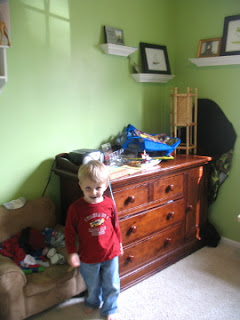So, it's been a little while, eh? Is your heart fonder towards me? Some stuff has happened since my last blog (like I had a baby) and there's so much I could say, but this post isn't really from me.
My mom, a kindergarten teacher of 26 years, and I were talking on vacation this summer about Isaiah starting school this year. We've had approximately one bajillion conversations about this recently and I think I have surprised both of us with my level of neurosis surrounding the matter. Since a number of my friends are in the same boat, I asked her if she would mind writing a few notes on getting ready...you know, if I were to ever blog again.
We got home from vacation and there it was. A polished document in my email complete with titles, headers, bold print, etc. I mean, it's clear where I got all my great grammar. (You're supposed to be agreeing with me.) So here are a few pointers from my beloved mom who is never, ever, not ever wrong, but please understand that these are simply
her suggestions based on her (pretty vast) experience. I have not consistently done everything that she wrote, but I will tell you like she tells me...it will be
fine, honey.
Ways to Prepare For the First Days of Kindergarten
Kindergarten jitters are normal and each child responds differently. There may be a range of emotions. Here are some suggestions to make this transition time smoother.
Address fears:
What if no one likes me? Review how to make introductions: “Hi, my name is Joe. What is yours?” Demonstrate how to make small talk at recess or lunch time using stuffed toys or dolls. Talk about taking turns and sharing.
Talk about how teachers are nice; they’ve chosen to work with little ones because they love them. Emphasize how your child can trust the teacher and talk to her about fears or concerns. (Remember that rumors are reports without facts to confirm the truth) One person’s dreaded teacher can be another’s favorite. Remain open-minded and model respect by not discussing her in front of your child.
What if you don’t pick me up on time? Explain how he will arrive and go home from school. Prepare him for the routines of arriving and leaving school whether his mode of transportation is car, bus, daycare van, or walking with parent.
What if I have to go to the bathroom? Assure your child he will have bathroom times in school. Discuss what to do if he needs to use the restroom in class: raise hand to ask permission. Make sure your child can get into and out of clothes quickly during bathroom time. Buttons, snaps should be easy to fasten for him. Make sure he knows to always flush and wash hands. Your child’s teacher will most likely ask for an extra change of clothes including underwear and socks in a labeled plastic zipper bag in case of accidents.
Practice some regular school routines such as: raising hand to speak, walking in line (with a “hand on the hip and a finger on the lip.” Always face the front of the line watching the person ahead of you so that you know when to walk and when to stop. Remember: “No talk, no touch” the 2 “T” rules.) Talk about staying in his seat unless he has permission to leave. Don’t worry if he doesn’t “get” it. We go over and over this during the first few days of school.
What if I get hungry? Discuss the school cafeteria and how everyone sits together and eats lunch together every day. Usually we eat quietly for the first 10 minutes and then can talk quietly to our neighbor when we are finished. Discuss eating quickly as we only have about 20 minutes. Try eating lunch @ 11-12 without snacking before. You may need to taper snacks to accomplish this. Rehearse lunch time. Some juice packs have straws. Teach your child how to open it. Practice opening other lunch items together. Reassure him that his teacher will help when he cannot open items himself.
Ask your child what questions he may have about starting school.
Review cutting with scissors; coloring with crayons; naming colors, shapes, numbers and letters he may already know (although it is not an expectation).
Shopping for school may help to generate excitement for school. Allow him to make some choices. Think about purchasing clothes (especially jackets, pants and shoes) that are kid-friendly. Can your child easily put on or remove it (especially during bathroom time)? Buy Velcro closures while you are teaching your child to tie his shoes. ***Label all jackets, sweaters, backpacks, lunch boxes, etc. with your child’s name!
Make sure your child goes to your school’s open house. Take a little tour. Look for the cafeteria, bathrooms, and playground. Practice walking to class. Help your child familiarize himself with his new classroom. Find the classroom bathroom, etc.
2 weeks ahead—ease into new routine of awaking at time needed for school, eating healthy breakfast. (Studies show children who eat breakfast do better in school.) Go through routines of getting ready. Teach your child what he needs to do independently to get ready quickly (getting dressed, making bed, etc.) Allowing your child to make choices (clothes, food, and school supplies) will help independent skills to increase. Making clothes and even food decisions the night before may make a more relaxed morning. Where will your child put his backpack every day after school? Where/when will he do his daily homework? Be sure to spend at least 15 minutes a day reading together.
Sometimes the first few days are difficult for parents and children to separate. There may be tears of both sides. Check yourself. Your worries and feelings of anxiety will transfer to him. Take care he doesn’t overhear you talking about your concerns. Modeling confidence and a positive attitude will help your child. Prepare your child by telling him ahead how you will say good bye. A quick firm but loving good-bye is the best way to go. Comfort him and tell him the next time you will see him. Reassure him that you will pick him up on time. Teachers are nearby to comfort with hugs and kind words. Leaving a small picture of your family may help to comfort your child. Leave brief love notes in his lunch box.
Your child will be hungry and tired when arriving home. Provide a snack and some down time.
My personal request: Many times a child will go home and relate happenings at school. That’s great and I certainly encourage that. Just remember this is coming from a 5-year-old perspective. He may not relay it exactly as it occurred. I am not saying your child is lying (although they will try to deceive us on occasion, much to our chagrin); however, it may be a difference in perception. Please give your teacher the benefit of explaining her standpoint if you have concerns about what your child says. Do not assume the worst. I usually tell parents that I will believe half students say about them if they will believe half of what they say about me. :)
Note: I welcome new and better ideas, suggestions, or questions. Feel free to email me at denise.harton@cabarrus.k12.nc.us . I promise to respond.
























